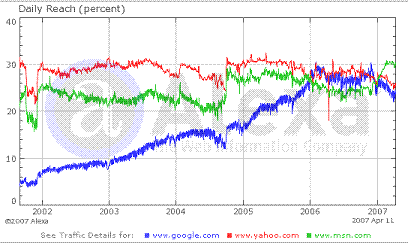We're now in a steady-state universe for internet publishing, with moderate contraction in the forecast, and Internet publishers are engaged in a zero sum game. If you're posting articles about publishing on the Internet, your gain is my loss, or vice versa, we're now competing over a fixed number of visitors and page views. For example, this blog ranks in the Top 10 for a Google search on Self Publishing, which brings in a grand total of a dozen visitors on a good day. Searching through the thousands of queries that brought visitors to my site on a typical day this week, only 25 had "self publishing" in any combination of words. So I consulted Google Trends to see what was going on. Over the three plus years they've been tracking the phrase, search volume is down about 20%. A search on Print on Demand shows about a 40% loss of interest over the same time span. But it's not just publishing related search.
I searched on gardening, car shopping, cooking, computers - all of these showed either a loss of volume or a plateau. To find growth these days, you have to choose subjects with a rapidly expanding audience, like global warming or Scarlett Johansson. As a publisher who's been tracking the performance of my web sites since 1995, I should have seen this coming two years ago, but nobody likes calling the top in a new economic model, even if it's not a bubble.
So I drew up a graph of the big three search engines daily reach on Alexa, and sure enough, the growth has topped out, despite the huge investments they are all making in gaining and holding users. My guess is the recent spike in MSN (green) has to do with the IE 7 upgrade and Vista winning them some default visitors:-)

So internet publishing is no longer a garden of low hanging fruit, it's a mature industry subject to the same competition and economies of scale as the book publishing industry. What I expect this means is we'll soon see consolidation taking place, as medium sized internet publishers will need to swallow up smaller publishers to grow, and big internet publishers will swallow the medium sized ones. It's been going on in all the media related industries for years, and now it will start in the Internet space.
It will be interesting to see how longer the independent internet publishers like myself will be able to hold on. I wrote early last year that the business model of the internet information entrepreneur was vulnerable to a concerted effort by any major book publisher with rights to a large backlist of nonfiction, or any other deep pocketed entity with Internet savvy willing to invest a few hundred million dollars into becoming THE destination for information seekers. Now that it has clearly become a zero sum game, I think the displacement effect of a new Goliath will be even more destructive to independent publishers than I had imagined. I'm not ready to give up on internet publishing yet, but the odds of it ever bringing me to Scarlett's attention have sunk from around one in trillion to one in a googol.
No comments:
Post a Comment